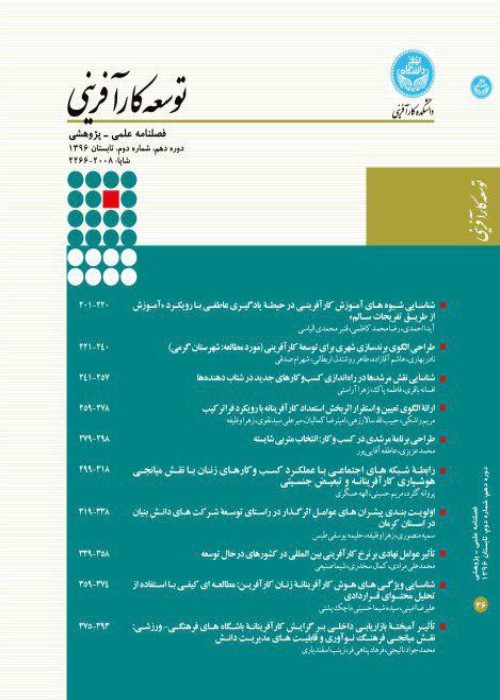The evolution of economic schools and the necessity of forming a new school
Author(s):
Article Type:
Research/Original Article (دارای رتبه معتبر)
Abstract:
Every scientific research begins with a problem, and sometimes posing a new question is itself a great innovation in the research process. Reviewing the concepts and intellectual structure of economic schools in their development from the classical school founded by Adam Smith to the German historical school, the Austrian school and the institutional school, shows that although all these schools have promised the peace and security of humanity, the human being with Genius and complex mental powers, capacities, abilities and skills are missing in all of them. According to Kant, the human being, the goal of his creation is the realization of freedom in both negative and positive aspects. Negative freedom as a form of freedom that is the responsibility of the governments and requires the provision of suitable conditions in the surrounding environment for free choice, freedom that provides the possibility of regulating human interactions under the protection of the rule of laws and regulations or in other words external institutions. made and protects the person from the aggression of others; But freedom in its positive aspect contains a deeper meaning. In fact, the non-transformation of man is in every thought, system and ideology that is made and developed by human hands, the freedom that provides the possibility of passing through the attachments and ties of the world of the senses and directs all the efforts of a person to know himself; A knowledge that is missing for today's modern man.With the realization of this aspect of freedom, the possibility of mastery over thoughts and intellectual frameworks is provided, and as a result of this inner peace, the field of creation and creativity and the elevation of the soul is provided, both for the individual and for others. Now the question is, which of these schools has been able to secure and guarantee freedom from the domination of external powers and encroachments and the freedom for internal elevation for mankind? Who is responsible for the fulfillment of this mission and the ideal of humanity? It seems that the current world and the current economic, social and political systems have given up on this serious responsibility and have settled for the lowest and lowest aspect of human rights, i.e. natural rights and unconditional freedom under the title of "economic liberalism" and what It is contrary to the true nature of a human being, they forced him.As the review of evidence and concrete examples of many important thinkers and philosophers shows that all economic systems that provide happiness, peace and prosperity for humanity have not only promoted the dominance of powerful countries over other countries and over their own kind, but also instrumentalist view of Man, who was created "essentially for excellence", has been made the basis for maintaining their desired ideology, and there is no sign of the spirit of freedom in these societies. Therefore, dealing with this important neglect in economic schools and explaining it by being in a neutral position and citing scientific and objective evidence is an important issue in this article.
Language:
Persian
Published:
journal of Entrepreneurship Development, Volume:16 Issue: 3, 2023
Pages:
4 to 30
magiran.com/p2660546
دانلود و مطالعه متن این مقاله با یکی از روشهای زیر امکان پذیر است:
اشتراک شخصی
با عضویت و پرداخت آنلاین حق اشتراک یکساله به مبلغ 1,390,000ريال میتوانید 70 عنوان مطلب دانلود کنید!
اشتراک سازمانی
به کتابخانه دانشگاه یا محل کار خود پیشنهاد کنید تا اشتراک سازمانی این پایگاه را برای دسترسی نامحدود همه کاربران به متن مطالب تهیه نمایند!
توجه!
- حق عضویت دریافتی صرف حمایت از نشریات عضو و نگهداری، تکمیل و توسعه مگیران میشود.
- پرداخت حق اشتراک و دانلود مقالات اجازه بازنشر آن در سایر رسانههای چاپی و دیجیتال را به کاربر نمیدهد.
In order to view content subscription is required
Personal subscription
Subscribe magiran.com for 70 € euros via PayPal and download 70 articles during a year.
Organization subscription
Please contact us to subscribe your university or library for unlimited access!


